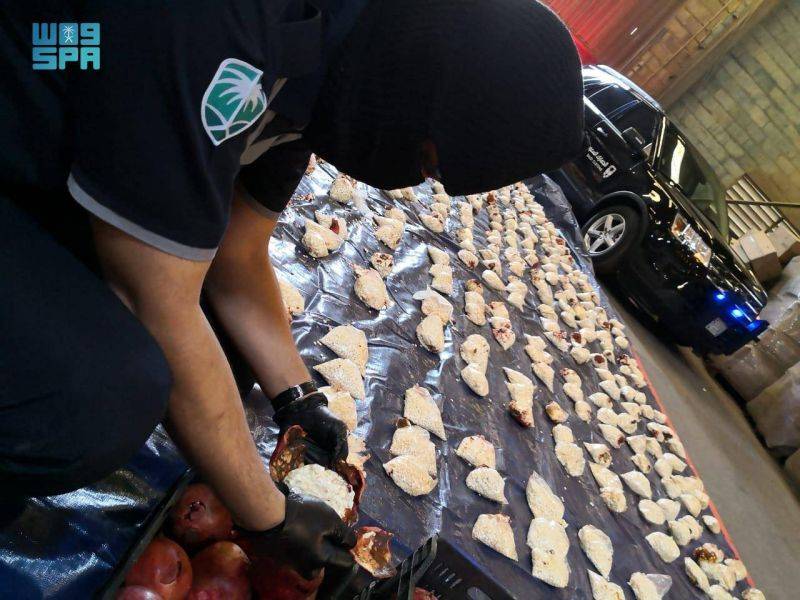
A Saudi policeman shows a seizure of captagon pills concealed in a shipment of pomegranates from Lebanon. (Credit: Twitter / @ Spa_Eng)
Want to get the Morning Brief by email? Click here to sign up.
Officials and stakeholders will meet at noon today at the Presidential Palace to discuss Saudi Arabia’s ban of fruit and vegetables from Lebanon. The Saudi decision followed officials’ announcement on Friday that they had found 5.3 million captagon pills hidden inside hollowed-out pomegranate fruit. Saudi Ambassador Walid al-Bukhari said that, over the past six years, the kingdom has seized more than 600 million pills and hundreds of kilograms of hashish shipped from Lebanon. The ban could increase economic pressure on Lebanon, especially on its local farmers, who have suffered as a result of the country’s financial collapse and shortage of foreign currency.
The Lebanese Forces’ parliamentary bloc will petition the Constitutional Council today to revoke a treasury advance for Électricité du Liban. Last month, a majority of MPs voted in favor of a LL300 billion treasury advance to the state-owned energy provider at the official exchange rate of LL1,507.5 to the dollar, amounting to some $200 million. These funds will come from the central bank’s dwindling foreign currency reserves — money that mostly belongs to depositors at Lebanese banks, prompting some to criticize the move that came without any reforms to the electricity sector. Since the 1990s, EDL has been running a huge deficit due to technical faults, high production costs and a failure to collect sufficient revenue from consumers. Covered by transfers from the treasury, it had contributed some $43 billion to Lebanon’s public debt by 2018 — almost half of the total public debt.
Ghada Aoun attended a hearing before the Judicial Inspection Authority on Friday as her dispute with fellow judge Ghassan Oueidat drags on. The hearing, which lasted four hours, saw her being questioned about her refusal to comply with Oueidat's order dismissing her from financial crimes. Aoun also filed a complaint challenging the legality of the public prosecutor’s decision as she pushes forward with her investigation of money laundering and illicit enrichment allegedly carried out by the Mecattaf Holding Group, Société Générale de Banque au Liban and central bank Gov. Riad Salameh. After raiding Mecattaf’s offices for the third time last week, Aoun secured computer servers and documents believed to hold information that is crucial to her investigations, a lawyer with knowledge of the case told L’Orient Today.
Lebanon received 47,970 Pfizer-BioNTech coronavirus vaccines on Saturday, bringing the total doses delivered to 439,920. Despite Lebanon’s slow inoculation program, the country has seen daily infections drop over the past month. “Covid indicators in Lebanon are improving: daily number of new cases, test positivity rate, hospitalizations, and deaths,” Firass Abiad, the head of Rafik Hariri University Hospital, tweeted last week. Over the weekend, Lebanon registered 2,835 new cases of COVID-19 while fifty-two more people died, bringing the death toll to 7,142.
The army thwarted an attempt to smuggle dozens of Syrian migrants to the Mediterranean island of Cyprus. The migrants were stopped in the northern district of Arida near the border with Syria on Sunday, the army said, from where they had planned to make the trip by boat. The latest smuggling attempt comes as Lebanon’s financial collapse accelerates, pushing the vast majority of the population into poverty. Lebanon, a tiny nation of some 6 million people, is home to some 1 million Syrian refugees who escaped the bloodshed in neighboring Syria during its 10-year-old civil war.
Gebran Bassil will travel to Moscow on Thursday as Lebanon’s government crisis rages on. The son-in-law of President Michel Aoun and leader of the Free Patriotic Movement is expected to meet with Russian Foreign Minister Sergey Lavrov, less than three weeks after Prime Minister-designate Saad Hariri made a similar trip to Moscow. Bassil, along with Aoun, has been at loggerheads with Hariri since the latter secured his return as premier in October 2020. On Saturday, Bassil lashed out at Hariri, accusing him of seeking veto power in the new government while describing his group as “liars.” In response, Hariri’s Future Movement released a statement accusing Bassil of “sabotaging” Aoun’s presidential term, now nearing its final year.